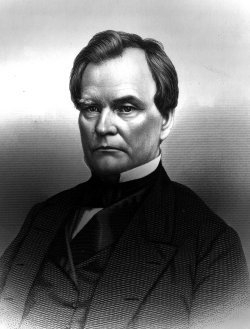| Benjamin
Wade was born near Springfield, Massachusetts. In 1821, he moved to Ohio, and in 1827 he
was admitted to the bar. He was elected prosecuting attorney in 1835, a state senator in
1837, and represented Ohio in the U. S. Senate, 1841-69. As a leading anti-slavery
advocate in the Senate he opposed the Kansas-Nebraska Act. During the Civil War, he was
chair of the Joint Committee on the Conduct of the War and sponsored the Wade-Davis Bill
(1864), an early attempt by Congress to wrest control over the Reconstruction process from
the President. The bill stipulated Confederate disfranchisement, a loyalty oath of 50
percent of the electorate, and abolition of slavery before a state could be readmitted to
the Union. It was pocket-vetoed by President Lincoln. Wade joined other Radical
Republicans to contravene President Johnson’s Reconstruction policies and attempt to
oust him from office. Wade’s position as president pro tem of the Senate made him
next in line to succeed to the Presidency. That caused several Moderate and Conservative
Republicans to resist the movement to impeach and remove Johnson because they considered
Wade to be a dangerous demagogue and opposed his stance on other issues, especially his
support of "soft money." Wade died in Jefferson, Ohio.
Robert C. Kennedy, HarpWeek
Source(s) consulted: Harper’s Encyclopedia of United States History; Albert
Castel, The Presidency of Andrew Johnson.
|
|

Benjamin Franklin Wade
(27 October 1800 - 2 March 1878)
Source: History of Congress, 1867-69, Vol. I |